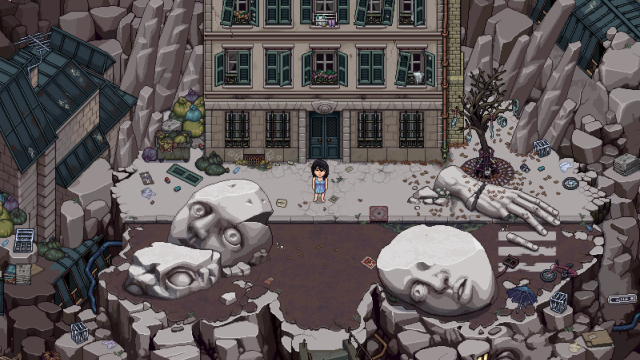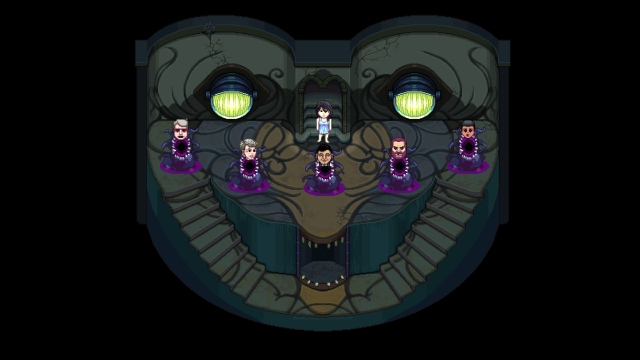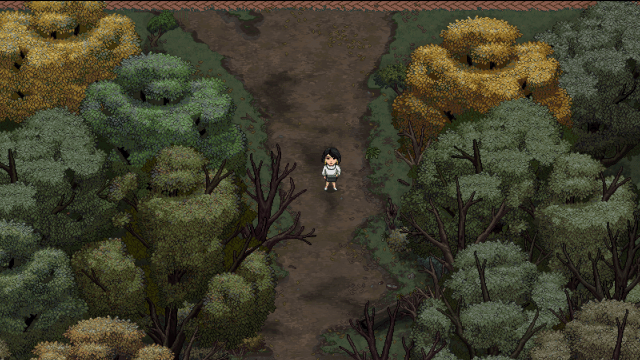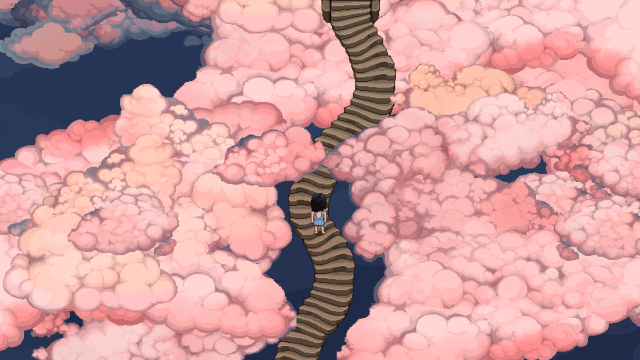I’ve played my fair share of pixel games, but none so deliriously beautiful or grotesque as the horror game Decarnation. But its beauty isn’t just skin deep – the symbolism and gameplay give this indie title nuance that kept me enthralled from curtain rise to swan song.
Decarnation Review | Beauty in the Grotesque
Decarnation centers on Gloria, a struggling Cabaret dancer in Paris circa 1990, who is at a brutal crossroad. Her girlfriend just broke up with her, her boss has decided she’s getting to be too old to be on stage, and her mother has a laundry list of disappointments she’s happy to recite and repeat. And just when a lifeline’s cast her way, Gloria’s kidnapped and imprisoned in a small cell in a basement, where she’s kept like a fish in a tank. But it’s in captivity that her story really begins.
A Story of Identity, Hope, and One Dense Protagonist | Plot & Character
The days after her kidnapping pass slowly, as Gloria goes through the stages of grief. Denial, anger, depression, acceptance. And while I expected Gloria’s world to shrink after she was confined to a small cell, a significant part of the game takes place in dreamscapes. A twisted Paris and her own apartment building, fraught with nightmares that embody all the things that have haunted her in her waking world.

It’s in these dreams that she travels through her own body. A body that seems to be layered by a metal skin, a fleshy dermis, and a skeleton that contains symbolic corridors and rooms. Within these chambers, she faces her demons and the parts of herself she doesn’t want to see… and becomes re-acquainted with the parts she’s forgotten. Visually, it’s a fantastic journey of healing and acceptance.
“Within these chambers, she faces her demons and the parts of herself she doesn’t want to see… and becomes re-acquainted with the parts she’s forgotten.”
Nevertheless, Gloria is painfully human. She’s stubborn, idealistic, perhaps delusional. But her worst trait is that she’s frustratingly dense. And it seems to be intentional. When Joy breaks up with her, she dreams it isn’t happening. When her boss asks to speak to her the next day, she thinks it’s to discuss a raise. She doesn’t want to see the truth that’s right in front of her face.
But what keeps you rooting for her is the fact that she’s so stubborn. She fails, backslides, and gets up just to do it all over again. And that’s the underlying theme of the game. Hope. Hope in the face of endless failures and seemingly impossible odds.

The story stretches for six acts. And while it’s clear that each act had its purpose, the notoriously difficult middle acts had moments where it simply dragged. If I were being generous, I could say that this was a well-done attempt to reflect the monotony of captivity, immersing us in Gloria’s experience. But in reality, I think these acts need to have their fat trimmed to help with the momentum around the climax and ultimate conclusion.
A Dash of Gameplay with Your Symbolism? | Gameplay
When it comes to pixel games, I don’t expect much in terms of gameplay. Perhaps a bit of point-and-click, a little juking monsters around tables, maybe some simplistic puzzles here and there. But Decarnation left me surprised and challenged.
Each moment of gameplay fed perfectly into the scene. Primarily, these moments of gameplay were symbolic, but at other times, they felt whimsical, adding a little levity to otherwise heavy topics. And at first, things start out simplistically.
Gloria is a dancer, so naturally, the first moments of true interactive gameplay are rhythm-based. And I’ll be frank. I am not a fan of rhythm games because I’m awful at them. But Decarnation forgives failure. Gameplay is there to add depth to the story, and losing just means restarting, likely one step from where you were, with no progress lost.

Which is fantastic, because as the game continues, things get significantly harder. There are sections that skew traditional survival horror, with monsters chasing you around tight rooms, but there’s also no shortage of puzzles, reflex tests, and other unique challenges. I thoroughly enjoyed the diversity and missed it when there were lulls in the narrative. Fortunately, those games come back in a big way in the last acts, with ramped-up difficulty.
And while this has nothing to do with gameplay, I really enjoyed finding the secret room in one of the dream sequences.
Parisian Pop and Phantasmagoric Dreamscapes | Visuals & Music
It’s the visuals of Decarnation that made me desperately want to play this game. Gloria, on a bed of symbolic viscera, interspersed with butterflies and forests? Screenshots of a misshapen and tragic woman that looked all too much like our tragic protagonist? Count me in.
Decarnation’s visuals surpassed my expectations by every metric. So much care and attention to detail went into each environment. And those visuals spanned the gamut of the surreal and beautiful to the mundane. Take, for instance, this idyllic walk down a tree-lined path. Look at those leaves. The color! The depth! I was and am awed.

The dreamscapes which dominate so much of this game naturally received the same masterful craftsmanship, while skewing darkly whimsical and symbolic. So many of the scattered items you’ll see in these scenes will seem like trash on your first play-through… only to be imbued with meaning in the second. Or if you happen to be looking through your screenshots while you’re writing a review.
“The dreamscapes which dominate so much of this game naturally received the same masterful craftsmanship, while skewing darkly whimsical and symbolic.”
Visually, the only moment that felt off was the inclusion of Gloria dressed as a geisha and running from a massive Oni mask. While it was, of course, beautifully drawn, the moment felt jarring and out of place in an otherwise coherent palette of symbolism and themes. Paris in the ’90s truly was a different time.
But what completes the atmosphere is the music that’s married to each scene. Decarnation begins with a poppy song from Fleur et Bleue, which was immediately added to my Spotify playlist. But as things fall apart, those saccharine tunes give way to a much more subtle soundtrack. A sort of low, melancholic, threatening beat, interspersed with organic and mechanical noise. It’s the whirr of Gloria’s inner psyche in all its turmoil, with its Parisian pop veneer peeled away.
That is to say, it’s excellent. Ten out of ten to the music and visuals, from start to finish.
It’s Time For The Final Swan Song | Concluding Thoughts & Scores
With all that said, Decarnation is my indie horror game of the year. I feel confident in making that declaration, with seven months standing between now and the big ball drop in New York. A game like Decarnation comes out once every few years, and it’s been a pleasure to review it.
Where it slacks, and thus fails to get that perfect 10, is in its narrative. Beyond Gloria being dense, the narrative struggled with a lethargic middle act, and lost some of its cohesion when supporting characters were brought in to share the limelight.
But overall, it’s a fun game that allows you to delve into a woman’s raw psyche and takes you along for the ride as she learns to heal and overcome. And for all its grotesqueries, it’s a fun time.
Available to play on Steam and PC on March 31.


DECARNATION
PROS:
● A realistic examination of human flaws and healing.
● Generally, excellent and realistic writing.
● Absolutely gorgeous visuals and music.
● You can pet the dog.
CONS:
● A lethargic middle act.
● Loses its coherence when secondary characters are brought into the limelight.
● A frustratingly delusional protagonist.
A copy of this game was provided by the publisher for review. Reviewed on PC.





Published: May 29, 2023 09:28 pm